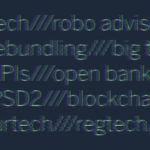The 10 global fintech trends
Blockchain, more regulations, emerging niche markets such as ‘insurtech’ y ‘regtech’... The future of fintechs has yet to be written but the trends shaping their future in the short- and medium-tern are already clear.

“The best way to predict the future is to create it”. This phrase coined by Peter Drucker, probably the most influential author on business management in the 20th century, served Luis Maldonado, state economist, IE Business School professor and advisor to the IFC (an arm of the World Bank focused on driving private investment in developing countries) to end a discussion on the future of fintechs organized by the entrepreneurial platform Finnovista. Nothing has been written but these are the 10 trends that are currently shaping the future of the sector in the short- and medium-term.
1. Traditional banking has changed strategy
The relationship between banks and ‘fintech’ startups has evolved from mistrust to collaboration and “now the banks themselves are directly doing fintech”, Maldonado says. This expert gave as an example the development of ‘roboadvisors’ within banks themselves when the trend was to reach agreements with specialized fintech and use their ‘roboadvisors’ as a white label. He pointed to Marcus, the new division of Goldman Sachs’ digital retail banking, “which shows that banks have the unusual ability to disrupt from within”.
BBVA is an example of collaboration with fintechs thanks to its 'create, adquire, invest and partner' strategy. During the last year, BBVA’s New Digital Business area has fostered several investments and acquisitions in the sector, as well as the creation of new startups, like Denizen, Tuyyo and Azlo.
2. From unbundling to rebundling
Unbundling is a term used in financial jargon to refer to separating the complete offer of a traditional bank into dozens of separate services. This is the strategy that fintechs have followed until now: offering niche financial services. But now they are staring to shift direction by focusing on rebundling. Through agreements among fintechs themselves, they are enriching their offer by offering more services. A good example of this is the N26 strategy.
In this new context, as Francisco González, BBVA's Chairman has pointed out, banks have the opportunity to become service providers, platforms (or marketplaces) for financial and non-financial services.
3. Fintechs are increasingly global
Monzo and Revolut announced it was going into the U.S. market, while going in the opposite direction, the U.S. firm Robinhood is disembarking in Europe.
Denizen, one of the companies that emerged in BBVA's New Digital Businesses area in San Francisco this year, offers a global bank account facility for expatriates and people who need to manage their money internationally, operates through APIs and represents a clear example of BBVA’s focus on open banking ahead of the rollout of PSD2.
4. Blockchain is here to stay
Maldonado said “bitcoin and blockchain are twins born at the same time” but predicted a different future for them. While “other platforms are solving the limitations of cryptocurrencies, blockchain is here to stay” and will be key in the development of fintechs.
5. PSD2 changes the rules of the game
The impact of the EU directive will be enormous within Europe, but felt in the rest of the world, Maldonado said. It constitutes an enormous push toward open banking, and intensifies the battle for customers. Banks “can also create platforms that allow them to lead these open banking ecosystems. Maldonado gave as examples to follow BBVA API_Market and Citi Developer Portal.
6. Big tech bursts on the scene
More than a promise, they form part of reality although they’re not making much noise about it. Maldonado gave as an example the Chinese firms Ant Financial (Alibaba partner) and Tencent and the U.S. giant Amazon. Amazon Payments (online payments platform for Amazon accounts) more than a year ago already had 33 million users and Amazon Lending lent more than $1 billion dollars to its platform sellers between June 2016 and May 2017.
7. The ‘insurtech’ market has matured
The market has seen standout developments linked to the internet of things, the rise of insurance as a service and the use of algorithms to predict the behavior of those insured, one of the strong points of the ‘insurtech’ Lemonade.
8. And ‘Regtech’ has a lot of potential
Regtech refers to a subsector within the fintech world that focuses on technological solutions for compliance with financial regulations. “This is a distinctive market in that banks are both investors and final users”, according to Maldonado, who pointed out that as a very regulated market it is fertile ground for this type of business.
9. Regulatory winds are blowing
Many countries such as China and South Korea have set their regulatory eye on ICOs and cryptocurrencies “but there are statutory bodies more receptive” to the fintech phenomenon as a whole such as in Mexico, according to Maldonado. The World Bank expert said different bodies of legislation will have their say in the struggle to shape the big global hubs of the fintech sector.
10. Fintechs represent a real opportunity for financial inclusion
Although the mobile phone is the main tool of financial inclusion, as Maldonado pointed out, “in some countries being a customer or not of a fintech marks the difference between being within or outside the financial system”.